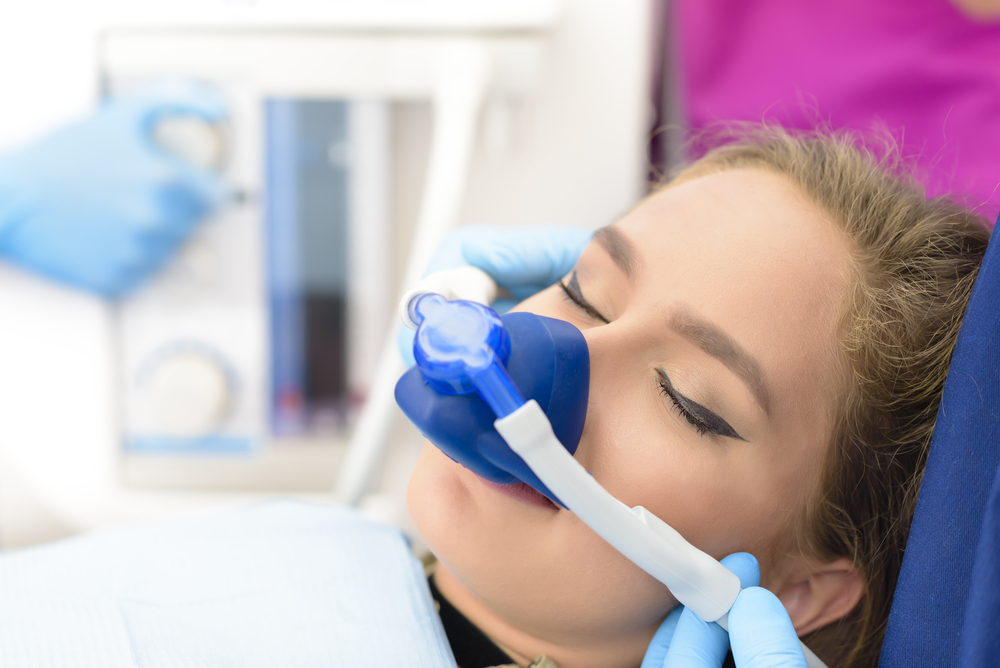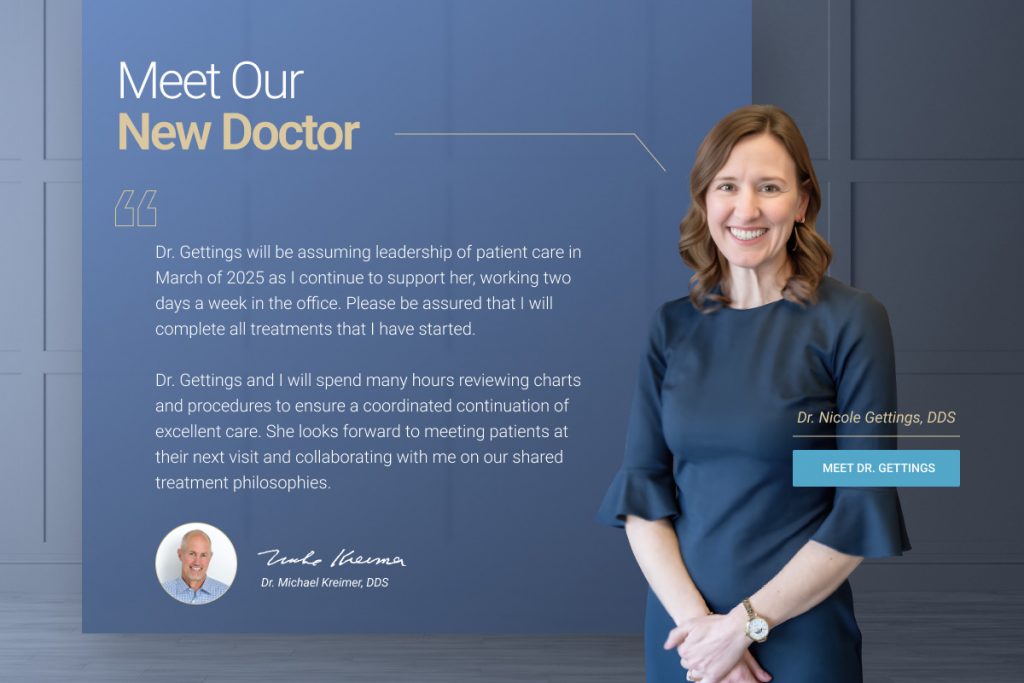Experience Anxiety-Free Dental Visits with Sedation Dentistry
If you feel nervous about your upcoming visit to the dentist, you’re not alone. Dental anxiety is common among patients and can get in the way of receiving the dental care you need. If you’ve dealt with a bad experience or have a fear of pain and needles, you may benefit from sedation dentistry.
At Michael Kreimer, DDS, Loveland sedation dentist, Dr. Michael Kreimer proudly offers IV sedation dentistry for patients with dental anxiety or severe gag reflexes. If you’re looking for a painless and relaxing dental experience in Hamilton, Clermont, and Warren counties, OH, Dr. Kreimer can help. Call our dental office at (513) 677-3656 to learn how this dental sedation can help you.

What is Sedation Dentistry?

When Is Sedation Dentistry Necessary?
Sedation dentistry is an option for patients who have dental anxiety. It’s completely optional and can be beneficial for patients who deal with any of the following:
- Severe gag reflex
- Sensitive teeth
- Dental anxiety or phobia
- Resistance to numbing agents
- Lengthy, complex dental procedures
- Don’t have time for multiple visits
- Have difficulty getting numb with local anesthesia alone
- Have special needs that make dental visits challenging
- TMJ troubles, can’t open their mouth for extended periods
- Sensitivity to light, noises, and smells in a dental office
Dr. Kreimer will schedule a consultation appointment first to answer any questions and screen for any medical reasons you may not be eligible for sedation dentistry. After an initial consultation, your sedation dentistry will be scheduled to take place before your procedure.
Types of Sedation We Offer
At Michael Kreimer, DDS, we provide various sedation options to suit your individual needs:
Local Anesthesia
While not a form of sedation, local anesthesia is often used in conjunction with other sedation methods.
Local anesthesia involves the administration of medication to numb a specific area, ensuring the patient experiences no pain during the dental procedure. While effective for minor interventions, it may not be enough for individuals with heightened anxiety or those undergoing more extensive treatments.
Nitrous Oxide (Laughing Gas)
Nitrous oxide is a mild sedative inhaled through a mask. It helps you relax while remaining awake and alert. The effects wear off quickly, allowing you to drive yourself home after the procedure.
Oral Sedation
Oral sedation involves taking a prescribed pill before your appointment. This method induces a deeper state of relaxation, though you’ll still be conscious. You’ll need someone to drive you to and from your appointment.
IV Sedation
For more complex procedures or severe anxiety, we offer IV sedation. This method delivers sedative medication directly into your bloodstream, producing a deep state of relaxation. You’ll be in a sleep-like state but can still respond to verbal cues.
Benefits of Sedation Dentistry
The advantages of sedation dentistry are numerous, including:
- Reduces anxiety and fear
- Minimizes discomfort during procedures
- Allows for multiple treatments in a single visit
- Ideal for patients with a strong gag reflex
- Helps those with low pain thresholds
Advantages of IV Sedation Dentistry
At Dr. Kreimer’s dental practice, we want your dental experience to be as comfortable as possible. That’s why we’ve chosen intravenous (IV) sedation as a special way to help you feel at ease during your procedures. Dr. Kreimer has advanced training in IV Sedation and is IV Sedation certified.
See how this approach can make your visit stress-free:
Rapid Onset
IV sedation boasts a rapid onset, allowing patients to achieve a profound state of relaxation swiftly. This quick-acting characteristic is particularly advantageous for individuals who may experience heightened anxiety before or during dental procedures, minimizing the time spent in distress.
Precise Control of Sedation Level
The intravenous administration of sedatives provides unparalleled control over the depth of sedation throughout the dental procedure. Dr. Kreimer’s expertise in carefully adjusting the sedation level ensures patients remain comfortably relaxed while maintaining the necessary awareness for effective communication and cooperation.
Deep Sedation for Anxious Patients
IV sedation offers the capacity for deep sedation, making it an ideal choice for patients with severe dental anxiety or phobia. Dr. Kreimer’s specialization in this method enables him to address the unique needs of anxious individuals, ensuring a calm and stress-free environment for even the most apprehensive patients.
Amnesic Effects
Another noteworthy advantage of IV Sedation lies in its ability to induce amnesia, meaning patients often have limited or no memory of the dental procedure. This amnesic effect not only contributes to a more positive patient experience but also reduces potential anxiety associated with recalling details of the treatment.
Our Unique Approach to Sedation Dentistry

Personalized Sedation Plans
We understand that every patient is unique. That’s why we create personalized sedation plans tailored to your specific needs, medical history, and level of anxiety. Dr. Kreimer will discuss all available options with you to determine the most appropriate sedation method for your situation.
Comprehensive Care Under Sedation
With sedation dentistry, we can often complete multiple procedures in a single visit, reducing the number of appointments you need. This approach is particularly beneficial for patients requiring extensive dental work or those with busy schedules.
The Sedation Dentistry Process
Before Your Appointment
If you’re scheduled for sedation dentistry, we’ll provide detailed instructions to prepare for your visit. This may include fasting for a certain period before the procedure and arranging for someone to drive you home afterward.
Before the dental treatment procedure, your Loveland dentist engages patients in a detailed informed consent process, explaining the costs of dental sedation as well as the benefits and potential risks associated with IV sedation. This transparent communication fosters trust and allows patients to make informed decisions about their sedation options.
During Your Appointment
Our experienced team will administer the chosen sedation method. Throughout the procedure, Dr. Kreimer and his specially trained team continually monitor patients, this ensures not only the effectiveness of sedation but also the safety of the patient. It’s important to note while patients remain awake and alert, they often have little to no memory of the appointment, creating an experience akin to being asleep. Patients describe feeling drowsy and unaware of the time passing by.
After Your Appointment
Following sedation, you may feel groggy for a few hours. It’s essential to have someone drive you home and stay with you until the effects wear off completely. We’ll provide aftercare instructions to ensure a smooth recovery.
Frequently Asked Questions
Is sedation dentistry safe?
Sedation dentistry is generally safe when administered by trained professionals. Before recommending sedation, your dentist will review your medical history and current medications to minimize any risks.
Will I feel any pain during the procedure?
Most patients experience little to no discomfort during sedation dentistry. The sedative helps you relax, while local anesthesia numbs the treatment area. Many patients report feeling as though they slept through their procedure.
How long do the effects of sedation last?
The duration of sedation effects varies depending on the type and amount of sedative used. Nitrous oxide wears off quickly, while oral and IV sedation may leave you feeling groggy for several hours after your appointment.
Can I eat before my sedation dentistry appointment?
Fasting requirements depend on the type of sedation used. For nitrous oxide, you can eat a light meal before your appointment. For oral or IV sedation, you may need to fast for several hours beforehand. Your dentist will provide specific instructions.
Will I be completely unconscious during the procedure?
Most forms of dental sedation do not render you completely unconscious. You’ll be in a deeply relaxed state but still able to respond to verbal cues. Only general anesthesia, which is rarely used in general dentistry, causes complete unconsciousness.
Transform Your Dental Experience with Sedation Dentistry
Don’t let dental anxiety prevent you from achieving optimal oral health. At Michael Kreimer, DDS, Family and Implant Dentistry, we’re committed to providing a comfortable, stress-free environment for all our patients.
Our sedation dentistry services allow you to receive the dental care you need without fear or discomfort. Whether you need a routine cleaning or more complex procedures, we can help you relax and feel at ease throughout your visit.
Take the first step towards anxiety-free dental care. Contact our Loveland office today at (513) 677-3656 to schedule your sedation dentistry consultation. We proudly serve patients from Loveland and the surrounding areas of Mason, Montgomery, and Blue Ash, OH.


